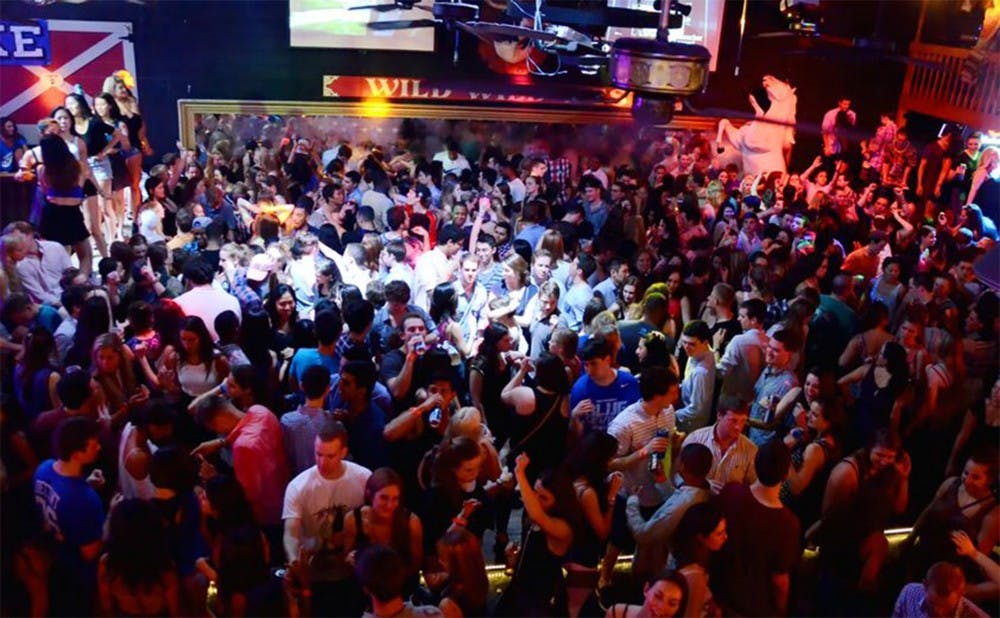Saturday nights at Shooters may become safer with a new initiative from Duke Student Government.
The intervention, called the Duke University Safe Keepers, aims to help prevent sexual assaults that may result from encounters at Shooters II Saloon. The initiative would consist of four teams of two students—one male-identifying and one female-identifying. The teams would be stationed outside of Shooters and on the corner of East Campus on Saturday nights, every night of Orientation Week and other days of expected high traffic, such as after basketball games between Duke and the University of North Carolina at Chapel Hill.
“These groups will basically be a resource to students. They’ll be there if people need help finding friends, they’ll be handing out waters, they’ll be helping people get home,” said senior Tristan Haas, senator for social culture, who introduced the program at last week's DSG Senate meeting.
During the meeting, some senators questioned how volunteers would be held accountable. Haas noted that participants may be asked to fill out reports after their shifts, detailing their interactions and concerns. The initiative is also planning to request funding from DSG to cover jackets for volunteers and water bottles to distribute at the venue.
The idea for the program came from discussions with Larry Moneta, vice president of student affairs, who wanted to increase prevention—not just awareness—of sexual assault, Haas said. A recent University survey found that 40 percent of undergraduate women report being sexually assaulted after enrolling at Duke.
Haas noted that encounters leading to sexual assault often begin at Shooters and that security personnel at the nightclub are more concerned with liability issues than students' well-being. Haas also said assaults may occur after students leave Shooters to return to their dorms.
“We’ve also gotten a lot of feedback from students that when people go out to Shooters and get separated from their friends, they’re more likely to go home with a guy or a girl because they feel uncomfortable walking through Durham alone,” Haas said.
Haas explained that students would commit to serve as volunteers one Saturday every few weeks.
Students interested in volunteering for the Duke University Safe Keepers group are expected to complete an interest form. Haas noted that he had been speaking with the Interfraternity Council, National Pan-Hellenic Council, Panhellenic Association and other groups in hopes of establishing a partnership through which their members would participate.
Student volunteers would receive "Prevent. Act. Challenge. Teach." training—a student-facilitated program sponsored by the Women's Center—in the Spring before the initial trial run of the program during Saturdays in April. As the official launch during Orientation Week 2017 approaches, participants would receive more intense bystander intervention and alcohol training.
"[The initiative will help students] either through creating groups of people who will travel home together or if someone is overly intoxicated but not to the level of [emergency medical services], a two-person team could potentially bring them back to their dorm to make sure they’re safe," Haas said.
Junior Colleen Sharp, co-president of the anti-sexual assault group We Are Here Duke, emphasized the importance of the training programs for potential volunteers. She said she has given Haas feedback for how to make the program work.
“One of the things that I expressed concern over was the gender and racial dynamics of intervening, and I think that’s something to be very conscientious about,” Sharp said. “Especially since the program is being run by Duke Student Government, I think that making sure that people intervening in situations aren’t responding or acting in ways that promote racial and gender and heteronormative hierarchies.”
Sharp said that she hoped intensive training could address these concerns and that the initiative could turn into a resource to get more students trained in bystander intervention.
The program could work in conjunction with other potential initiatives, Sharp said. The Women’s Center and Duke Students Against Gender Violence have been working with Shooters owner Kim Cates and her bar staff to reduce incidents at the club.
“I’m really excited about the prospect of doing work that directly can impact how people are experiencing gender violence and sexual assault at Shooters,” Sharp said.
Get The Chronicle straight to your inbox
Signup for our weekly newsletter. Cancel at any time.

